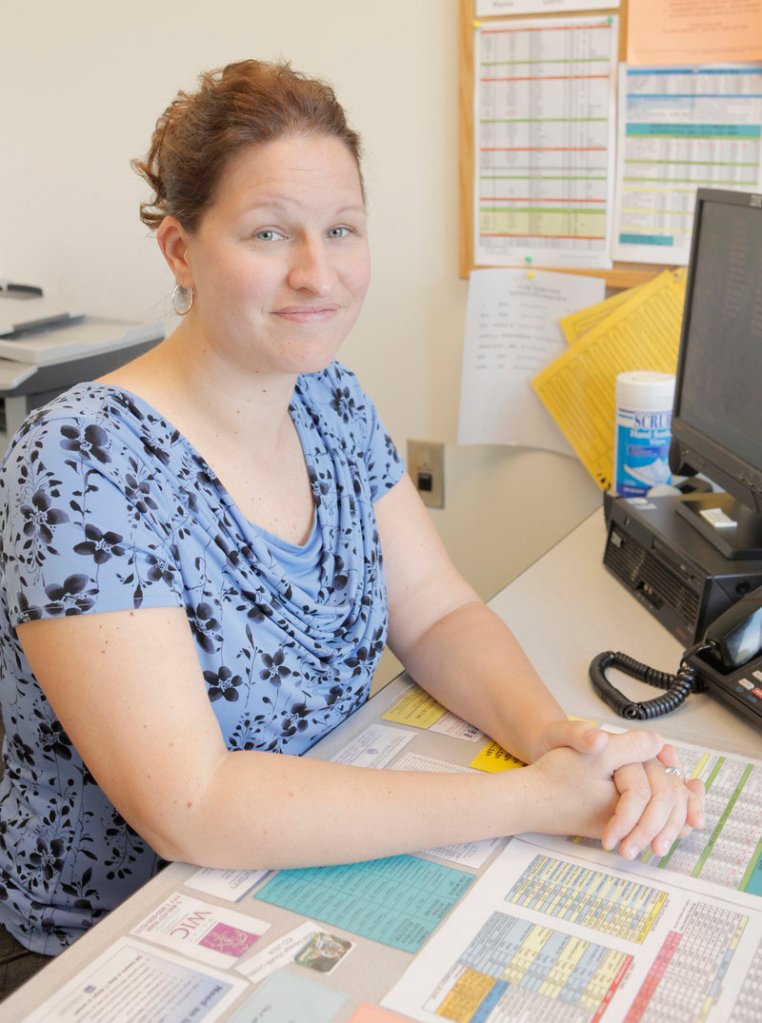By the time Trista Collins starts work, a growing line of people is waiting to get in her office.
And they’d all rather be someplace else.
“It’s tough to walk in these doors and ask for help,” Collins said.
Collins is one of 330 front-line caseworkers for the Department of Health and Human Services statewide, and one of 53 at the agency’s busiest regional office on Marginal Way in Portland. They are the gateway to a maze of more than two dozen state and federal anti-poverty programs.
Each program has different rules and benefits, which seem to change constantly. Even after eight weeks of intense training, monthly follow-ups and two years on the job, Collins says she is still learning about the system.
“The amount of policies and the amount of information,” she said, “is unbelievable.”
The need seems endless, too.
An average of 230 people come to the DHHS office here each day, a number that would have been an extremely heavy day three years ago, says Terry Hamilton, who heads the DHHS office in Portland.
About a third of those are new applicants, while most are coming to update their cases. Since most don’t have appointments, the average wait is about two hours.
Caseworkers in Portland average 650 cases apiece. The average caseload statewide is between 700 and 750.
Collins spends part of each day processing paperwork on her own cases, but she and other caseworkers also see whoever is next in line. Caseloads are too large for them to keep close track of the same families or individuals all the way through the system.
“What is it that brings you here today?” is typically Collins’ first question.
The conversation that follows frequently gets emotional. It can last 15 minutes or two hours, she said.
Caseworkers start at $14.44 an hour and have to have the skills to resolve conflicts and deal with “irate customers,” according to the official job description.
While many applicants are tearful and thankful, some are angry that there is not enough help.
“People are stressed right now; it’s difficult,” Collins said.
Collins asks about their circumstances, gathers pay stubs and other documents and, with the help of a computerized screening system, determines what assistance the person qualifies for.
“To tell someone we can help with food, the relief that we see … is an incredible thing,” she said.
If an applicant meets eligibility standards and other rules, Collins can provide food supplements the next day through a debit card. An able-bodied parent who qualifies for cash assistance through Temporary Assistance for Needy Families must meet with a specialized caseworker and agree to a work contract and plan for independence before receiving aid, which is placed on the same debit card.
People who don’t comply with the contracts can lose benefits for one month, although the children’s portion of the benefits is not withheld. Misleading a caseworker can mean a one-year suspension or, in rare instances, a criminal fraud case.
While the system is sometimes abused, Collins said, “it’s not anywhere near what people think it is.”
And some of the personal stories are difficult. “You don’t want to see people struggling,” she said.
But she also feels good about the people who got help, she said. “That’s what you go home with.”
Staff Writer John Richardson can be contacted at 791-6324 or at: jrichardson@pressherald.com
Send questions/comments to the editors.



Success. Please wait for the page to reload. If the page does not reload within 5 seconds, please refresh the page.
Enter your email and password to access comments.
Hi, to comment on stories you must . This profile is in addition to your subscription and website login.
Already have a commenting profile? .
Invalid username/password.
Please check your email to confirm and complete your registration.
Only subscribers are eligible to post comments. Please subscribe or login first for digital access. Here’s why.
Use the form below to reset your password. When you've submitted your account email, we will send an email with a reset code.